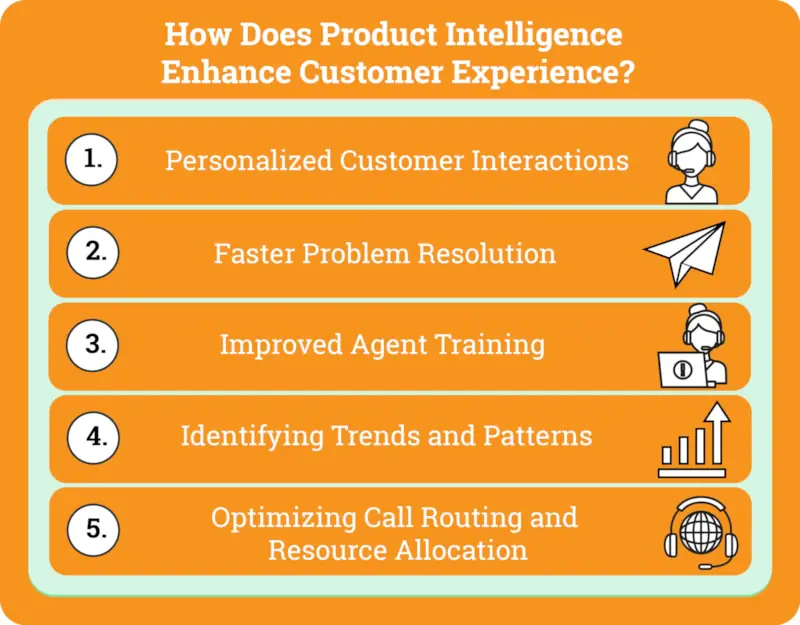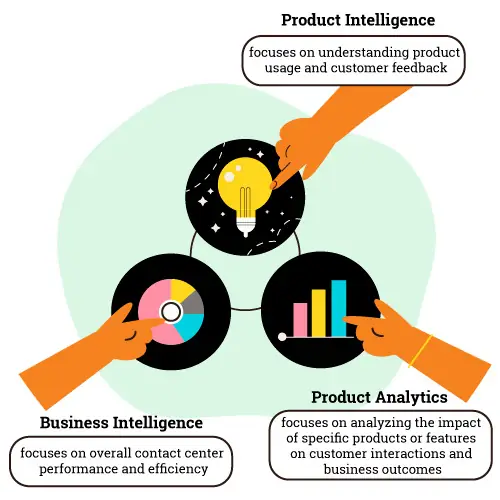By harnessing the power of data analysis and insights, product intelligence significantly improves the customer experience. It enables a more personalized, informed, and efficient service, ultimately increasing customer satisfaction.
What Is Product Intelligence?
How can businesses understand how well their products meet customer needs? How can they know what makes customers happy and loyal? Or how can they find out how to make their products more suitable to their target market? The answer to all those questions involves product intelligence.

Product intelligence refers to the use of data analysis tools to understand customer interactions and needs, aiming to improve customer service and satisfaction. It involves gathering information from calls, messages, and other interactions to identify patterns and insights that can be used to enhance the overall customer experience.
Product intelligence is a smart system that uses data from various sources to give valuable insights about how well a product is doing, how customers interact with it, and what's happening in the market. It includes gathering, studying, and understanding data about how customers behave, use the product, and give feedback.
For example, let’s say a call center uses product intelligence to analyze customer calls. They might notice a recurring issue where customers are having difficulty navigating a specific feature of the company's software. With this insight, they can work on improving the user interface or providing more explicit instructions, ultimately enhancing the customer experience and reducing frustration for callers.
By integrating product intelligence into their operations, call centers can gain a comprehensive understanding of the product-related issues that customers face, the most frequently asked questions, and the common feedback patterns.
This insight enables agents to be more informed and prepared to address customer concerns, manage expectations, and provide relevant and timely solutions. Product intelligence thus acts as a bridge between customer feedback and product improvement, ensuring that call center operations are reactive and proactive in enhancing product value and customer satisfaction.
For example, through product intelligence, a call center for a telecommunications company identifies a recurring issue where customers frequently complain about slow internet speeds after installing the router. Further analysis reveals that this problem often occurs in households with multiple connected devices. With this insight, call center agents can proactively address customer concerns by providing troubleshooting steps tailored to this issue.
How Does Product Intelligence Enhance Customer Experience?


1. Personalized Customer Interactions
One of the standout benefits of integrating product intelligence into call center operations is the ability to offer personalized customer interactions. By analyzing customer behavior and product usage patterns, agents can tailor their communication to meet each customer's specific needs and preferences.
Whether it's recommending a product feature that the customer hasn't used yet or addressing a potential issue before it escalates, personalized interactions significantly boost customer satisfaction and loyalty. This level of personalization makes customers feel valued and understood, enhancing their overall experience.

2. Faster Problem Resolution
Product intelligence facilitates faster problem resolution by equipping agents with information about the product's functionalities, issues, and solutions. Instead of navigating through a cumbersome process of trial and error, agents can directly pinpoint the problem based on the insightful data provided by product intelligence.
This efficiency not only improves the agent's ability to resolve issues swiftly but also reduces customer wait times and frustration. The quicker resolution of problems leads to increased customer satisfaction, as customers appreciate efficient and effective service.

3. Improved Agent Training
Lastly, the insights gained from product intelligence significantly contribute to improved agent training. By analyzing customer interactions and feedback, call centers can identify the specific areas where agents need more knowledge or better communication skills.
Training programs can then be tailored to address these gaps, equipping agents with the necessary expertise to handle a wide range of customer inquiries and issues confidently. Moreover, ongoing access to up-to-date product information ensures that agents remain knowledgeable about product features, usage tips, and troubleshooting, which is crucial for delivering high-quality customer service.

4. Identifying Trends and Patterns
Through the aggregation and analysis of data, product intelligence helps identify underlying trends and patterns in customer behavior and preferences. This insight is invaluable for forecasting demand, understanding customer pain points, and tailoring services to meet customer needs more accurately. By staying ahead of these trends, call centers can proactively adjust their strategies and operations, ensuring they are always aligned with customer expectations.
For example, a telecommunications call center might notice a trend in households with multiple connected devices calling in to complain about slow internet speeds after a new router is installed. Companies can then proactively address the slow internet speeds before installing a router with multiple connected devices in a household.

5. Optimizing Call Routing and Resource Allocation
Optimizing call routing and resource allocation is another area where product intelligence dramatically impacts call center efficiency. By analyzing data on customer queries and agent performance, calls can be routed to the most suitable agent, thus ensuring that customer inquiries are resolved quickly.
Insights derived from product intelligence can also help call centers in staffing decisions, training needs, and allocating resources more effectively to handle peak load times, thus improving overall operational efficiency.
How Does Product Intelligence Work?
Product intelligence in a call center involves gathering, analyzing, and interpreting data related to the products or services offered by the company. Here's how it typically works:
1. Data Collection:
The first step in product intelligence is collecting relevant data. In a call center, this data can come from various sources, such as customer interactions (phone calls, chats, emails), customer feedback surveys, product usage metrics, and CRM (Customer Relationship Management) systems. This data may include information about product inquiries, complaints, compliments, feature requests, and overall customer sentiment related to the products or services.
2. Data Analysis:
Once the data is collected, it's analyzed to extract meaningful insights. This analysis can involve various techniques such as text, sentiment, trend, and correlation analyses. The goal is to identify patterns, trends, and correlations related to product usage, customer satisfaction, common issues, and opportunities for improvement.
3. Insight Generation:
Based on the analysis, insights are generated to inform decision-making and strategy development. These insights may include identifying frequently reported issues with products, understanding customer preferences and pain points, pinpointing areas for product enhancement or optimization, and uncovering opportunities for new product development or feature additions.
4. Actionable Recommendations:
Product intelligence doesn't stop at insights; it also involves translating them into actionable recommendations. These recommendations may be aimed at improving product design, enhancing user experience, addressing common customer concerns, or aligning product offerings with customer needs and preferences.
5. Continuous Improvement:
Product intelligence is an ongoing process that requires continuous monitoring, analysis, and adaptation. Call centers must regularly review and update their product intelligence strategies to stay responsive to changing customer needs, market dynamics, and product performance metrics. This may involve refining data collection methods, updating analysis techniques, and iterating on recommendations based on feedback and results.
Overall, product intelligence in a call center enables organizations to better understand their products, their customers, and the interactions between the two. By leveraging data-driven insights, call centers can make informed decisions to improve product offerings, enhance customer satisfaction, and drive business growth.
What Is the Difference Between Product Intelligence, Business Intelligence, and Product Analytics?
Product Intelligence, Business Intelligence, and Product Analytics are all related concepts but focus on different aspects and serve distinct purposes within a call center environment.
While all three concepts involve data analysis and insights generation, they each have a distinct focus within the call center. Product Intelligence focuses on understanding product usage and customer feedback, Business Intelligence focuses on overall performance and efficiency, and Product Analytics focuses on analyzing the impact of specific products or features on customer interactions and business outcomes.

Product Intelligence
Product intelligence refers to insights about the company's products or services. It involves understanding how customers utilize the products or services, identifying improvement areas, and discovering innovation opportunities. Product intelligence often involves analyzing customer interactions to understand how well products or services meet customer needs and expectations.
Example: A call center for a telecommunications company uses product intelligence to analyze customer calls regarding a newly launched internet service. They track customer feedback, common issues encountered, and suggestions for improvement to refine the service and enhance customer satisfaction.
Business Intelligence
Business Intelligence (BI) encompasses a broader scope, focusing on the overall performance and operations of the call center. It involves analyzing various data sources to derive insights that drive strategic decision-making, improve efficiency, and optimize processes. BI might involve analyzing metrics such as call volume, average handling time, first call resolution rate, customer satisfaction scores, and agent performance.
Example: A call center manager uses business intelligence tools to analyze call volume trends over time, identifying peak hours and allocating staffing resources to ensure optimal service levels.
Product Analytics
Product Analytics systematically analyzes data on the usage, performance, and impact of specific products or features. In a call center, product analytics can help understand how different product features or offerings influence customer behavior, satisfaction, and overall business outcomes.
Example: A call center for a software company uses product analytics to track how customers interact with different software features during support calls. They analyze which features are most frequently discussed, identify usability issues, and use this data to prioritize feature improvements in future product releases.
